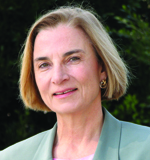September 2013

Patricia W. Finn, MD
As you read this month’s message, many of us are traveling to the European Respiratory Society Congress in Barcelona, Spain, where the ATS Executive Committee will meet with our colleagues from the Forum of International Respiratory Societies (or FIRS). The mission of FIRS is to promote advocacy in matters of global respiratory health and to identify new areas for global respiratory initiatives. Along with the ATS, members of FIRS include the Asociacion Latinoamericana del Thorax (ALAT), the American College of Chest Physicians (ACCP), the Asia Pacific Society of Respirology (APSR), the European Respiratory Society (ERS), the International Union Against Tuberculosis and Lung Disease (The Union), and the Pan African Thoracic Society (PATS).
A key topic at this FIRS meeting will be preparation for the next the United Nations Summit on Non-Communicable Diseases tentatively scheduled for September 2014. During the summit, FIRS, on behalf of ATS and its other members, will represent lung diseases that fall into the NCD category. The first summit, which was held in September 2011, was the first high-level UN meeting to tackle the global NCD epidemic. At the next summit, health equality will certainly be a focus.
You are most likely familiar with the staggering statistics: more than an estimated one billion people suffer from chronic respiratory conditions and billions more are exposed to toxins in their environments that directly affect the respiratory system including biomass fuel, outdoor air pollution, and tobacco smoke. Our task at the UN summit will be to bring these issues to the fore.
At the ERS Congress, FIRS will meet and discuss an important new document that serves as a world report on the state of respiratory diseases and what can be done to help. The roadmap, “Respiratory Diseases in the World: Realities of Today–Opportunities for Tomorrow,” outlines several essential actions that will improve global respiratory health. We will inform our members once the document is available.
First on the agenda is to increase public and policymakers’ awareness of both adult and childhood respiratory disease and how improving health can benefit economies. To enact change, we must urge policymakers to enable universal access to quality health care, which must include making essential medications available to patients with respiratory disease. Prevention is paramount, so we must advocate for universal coverage for childhood and adult immunizations, including new and existing conjugate vaccines.
These actions directly address the political declaration that resulted from the first UN NCD meeting. This call to arms focuses on the developmental, social, and economic challenges posed by NCDs, especially in developing countries.
We look forward to working with the UN not only to form but to execute a list of action items that will improve global health and establish health equality as a global priority.

